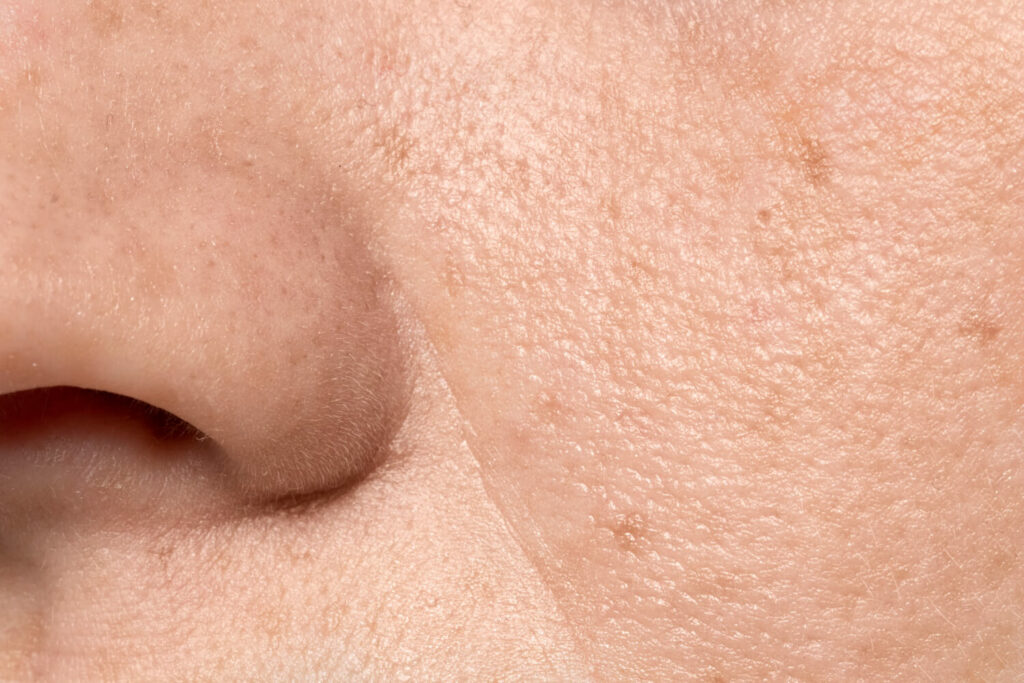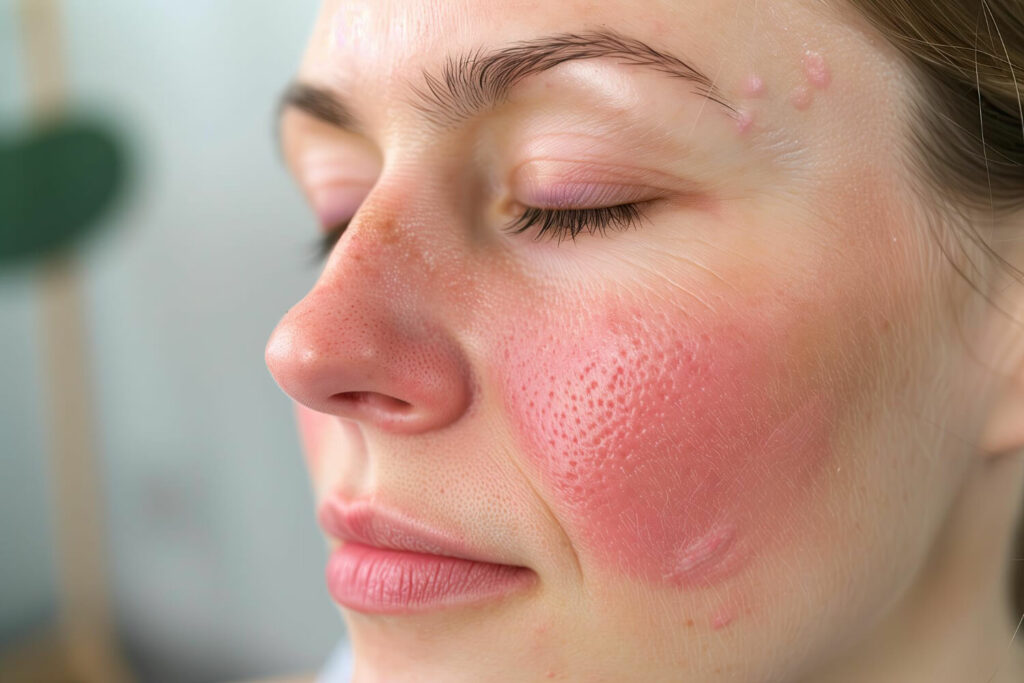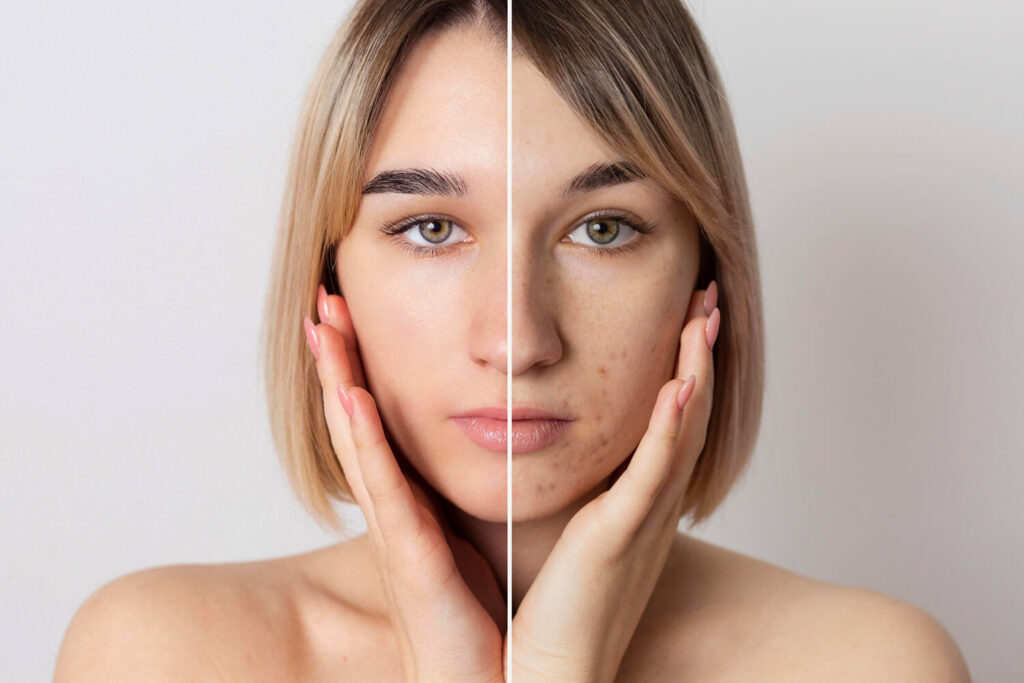Have you ever looked closely at your face in the mirror and asked yourself – Why are my pores so big? Pores are a normal part of our skin, but when they appear large, they can become a bit of a beauty concern.
Let’s discover the reasons behind enlarged pores and explore some strategies to minimize their appearance.
First, let’s acknowledge that pores are not the enemy. These tiny openings actually serve a crucial purpose. They house sebaceous glands, which produce sebum, a natural oil that helps keep our skin hydrated and protected. Without sebum, our skin would become dry, cracked, and vulnerable. So, pores deserve a little appreciation!
However, sometimes these hardworking pores can appear larger than we’d like. There are three main factors that influence pore size: genetics, age, and hormones.
What are Pores?
While we often focus on minimizing their appearance, pores are actually essential components of healthy skin. These tiny openings found all over your body except for the palms of your hands and soles of your feet, play a critical role in keeping your skin functioning properly.

Pores are little “holes” that connect the deeper layers of your skin and the outside world. They come in two main types: oil pores and sweat pores.
Oil pores, also known as follicular pores, are connected to sebaceous glands. These glands produce sebum, an oily substance that helps keep your skin hydrated, supple, and protected from external irritants.
Sweat pores, on the other hand, are connected to sweat glands. Sweat helps regulate your body temperature by evaporating from the skin’s surface.
The size and distribution of pores vary across different areas of your face. They tend to be more concentrated and larger in the T-zone (forehead, nose, and chin), where oil glands are more abundant. While some people naturally have larger pores due to genetics, factors like age, hormones, and lifestyle choices can also influence their appearance.
Why are the Pores on My Nose so Big?
The nose is ground zero for noticeable pores, and there are a couple of reasons for this. Your nose has a higher concentration of oil glands compared to other areas of your face. These sebaceous glands produce sebum, the natural oil that keeps your skin hydrated. Because your nose has more of these glands, it naturally has larger pores to accommodate them.
On top of that, the sebaceous glands on your nose tend to be bigger than elsewhere on your face. Think of them as oil factories – bigger factories mean bigger doorways to let the oil out, which translates to larger pores on your nose. These factors combined make the pores on your nose appear more prominent than those on other parts of your face.
Why are My Pores so Big on My Cheeks?
For the same reason as they are on your nose, but there could be many reasons. It could be because of the sun damage or, more believably, because of your genes.
In the next section, we will cover all the different factors which could affect the size of your pores.

Main Factors Affecting Pore Size
Our pores aren’t solely determined by our daily routines; some factors are simply out of our control.
Genetics play a significant role in pore size. Just like your hair color or height, you inherit a predisposition for pore size from your parents. Those with naturally oilier skin tend to have larger pores to accommodate the increased sebum production.
As we age, another factor comes into play – collagen and elastin, the proteins that give our skin its youthful plumpness, start to decline. This loss of elasticity causes the skin around pores to loosen, making them appear larger and more noticeable.
Hormonal fluctuations can also be a major player in pore size. During puberty, menstruation, or pregnancy, our bodies experience hormonal shifts that can trigger an increase in oil production. This excess oil stretches out the pores, making them appear larger.
If you’ve ever noticed your pores seem more prominent around your period, you’re not alone! These hormonal changes are a natural part of life and can significantly impact the appearance of our pores.
Lifestyle Factors That Can Worsen Pore Appearance
The 2 big lifestyle factors that can worsen pore appearance are sun damage and improper skin care.
While a healthy dose of sunshine can boost our mood and vitamin D levels, excessive sun exposure is a major culprit when it comes to enlarged pores. The sun’s ultraviolet (UV) rays damage collagen and elastin, the very building blocks that keep our skin firm and elastic.
This breakdown accelerates the loss of skin firmness, contributing to stretched-out pores. So, while soaking up the sun might feel good at the moment, neglecting sunscreen can have long-term consequences for your complexion.
Make sure to slather on a broad-spectrum sunscreen with SPF 30 or higher every day, rain or shine, to protect your skin from harmful UV rays and keep your pores looking their best.
Along with sun damage, our skincare routine plays an important role in pore health. But it’s important to find the right balance.
Overwashing your face can be just as detrimental as under-washing. Harsh cleansers can strip your skin of its natural oils, which can actually trigger your body to produce even more oil to compensate. This excess oil can clog pores and make them appear larger.
On the other hand, if you don’t cleanse your face enough, dirt, oil, and dead skin cells can build up on the surface, leading to clogged and stretched pores. Finding a gentle cleanser that effectively removes impurities without stripping your skin’s natural moisture is really important if you want to maintain a balanced complexion and minimize the appearance of pores.
How to Minimize Pores?

Pores can be a pain, but there are some easy ways to minimize their appearance:
- Cleanse Wisely: Wash your face daily with a gentle cleanser that removes dirt without stripping your skin. Overwashing can trigger oil production, making pores look bigger.
- Sunscreen is a Must: Daily sunscreen protects your skin from sun damage. Sun exposure weakens collagen, causing pores to stretch and become more noticeable.
- Exfoliate Regularly: Get rid of dead skin cells with a chemical exfoliant like AHAs or BHAs. Exfoliating helps prevent clogged pores and keeps your skin looking fresh.
- Try Retinol: Try using a retinol product at night. Retinol promotes cell turnover, preventing dead skin buildup and minimizing the appearance of pores.
Follow these tips and you’ll be on your way to a smoother, more even complexion.
Share this Global Newsly article on Facebook, TikTok or Instagram.




